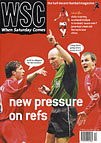 Harry Pearson casts an agnostic eye over some recent additions to the bulging pile of religious tracts on England's World Cup triumph and its aftermath
Harry Pearson casts an agnostic eye over some recent additions to the bulging pile of religious tracts on England's World Cup triumph and its aftermath
If the BBC commentator Kenneth Wolstenholme had been a clairvoyant, he might have altered his most famous line to: “They think it’s all over… but it’s only just begun.” Because if a Hollywood movie were ever made about the 1966 World Cup final the tagline on the poster would surely read: “One team, one trophy, 100,000 books.” As a letter in last month’s WSC observed, the further away that Gilded Saturday Afternoon In Late July gets, the greater the significance it seems to assume. If the number of volumes devoted to 1966 in the past few years increases exponentially by the end of this century, our descendants may indeed begin talking of it as The Greatest Story Ever Told.
The whole thing is so well rehearsed now that new pieces of information smack you across the shins like a brutal Bulgarian. Invariably these concern Sir Alf Ramsey, a man whose awkward, eccentric presence would be guaranteed to enliven any book. Asked to define the man’s special qualities by David Coleman, Jack Charlton replies that he is “frightening”. But surely the players also feel respect for him, Coleman warbles. “‘Frightened’ might be a better word,” brother Bobby interjects, showing a previously undreamed of understanding of human nature. “He frightens you. You can call it respect if you like."
This exchange is recorded in Jeff Dawson’s entertaining book about Mexico 70, Back Home, a volume that benefits both from looking at 1966 in the rear view mirror and the fact that you know at some point in its pages you are going to come across Alan Ball and Emlyn Hughes feeling very disappointed indeed.
There is an egalitarian spirit at work here too as the net widens ever further to find people who can say something fresh about The Big Day. Everybody gets to say his or her piece from the lowliest ballboy to the highest Shepherdson. In Voices of 1966: Memories of England’s World Cup, Norman Shiel has done something none of the Gospel’s authors had the sense to – interviewed lots of ordinary people who were actually there. Or, in the case of T Myatt, almost there: “For the final I stopped off on my way south for a holiday and watched the game on television at my brother’s house in Bristol. I always preferred standing at matches.”
F Furness’s “amazing memory” comes from Ayresome Park, where he saw North Korea beat Italy. When Pak Do Ik scored, “a wag in the crowd said ‘That’s another fucker here’ – perhaps a reference to the fact that the Koreans had only managed one goal prior to that in their 1-1 draw against Chile.” If only the Apostles had done the same we’d have got something equally elliptical about the Sermon on the Mount: “Well there was a big crowd, but the thing that really sticks in my mind was Jesus’s feet. They were quite large for a man of his height. Mother made felafel for supper that night, which was unusual for a Thursday.”
At the core of 1966 is The Mystery. As Geoff Hurst puts it in his old-fashioned, workmanlike autobiography, 1966 And All That (if the Battle of Hastings had occurred a year later how much more difficult the job of the publisher would have been): “Was it a goal? Did the ball cross the line? Those two questions have haunted me for most of my adult life.” He doesn’t know the answer, he tells us, and he doesn’t think he ever will.
Hurstie (as everyone, including his wife, seems to call him) is a straightforward chap, so I think he is sidestepping the bewildering truth, which is simply: Yes, it was a goal. No, it didn’t cross the line. Of course, this is paradoxical and hard for laymen to accept, but the Lord moves in mysterious ways. His word is final, as is that of the referee. You just have to go with Him on some things whether you understand them or not.
You have to trust Geoff Hurst on some things too. Like any OAP looking back, accuracy isn’t always his strong suit. This becomes apparent when comparing his account of 1970 with Dawson’s. “The only player who’d had a hint of sickness was Chelsea’s Peter Osgood, who missed training one day with an upset stomach,” Hurst tells us of the Gordon Banks incident. Back Home tells a different story. According to Dawson, who interviewed team doctor Neil Phillips: “Allan Clarke missed the Brazil game with a similar ailment but was right as rain within 24 hours. Keith Newton and Bobby Charlton had the same trouble as Banks only yesterday but are now on the road to recovery.” Osgood, meanwhile, has since admitted he missed the training session because of a hangover.
That is not to say Sir Geoff is wrong. History, after all, is often all about perspective. However, in this case many readers may find themselves concurring with the sage words of Dave St Hubbins. When it comes to 1966, there is very definitely too much perspective.
From WSC 178 December 2001. What was happening this month